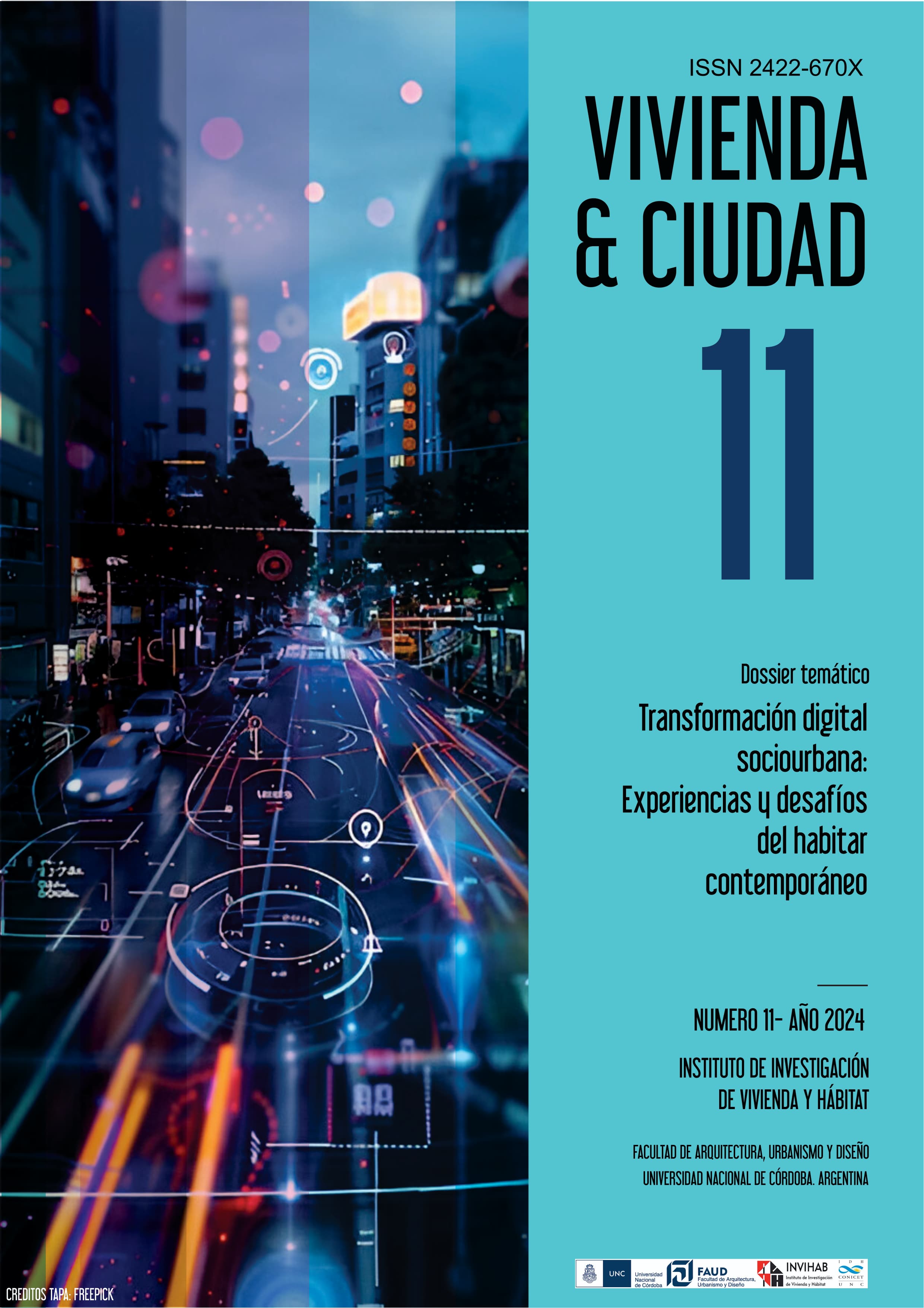Transformación digital en la gobernanza urbana
un análisis sistemático de la literatura existente
Palabras clave:
Trasformación Digital, Gobernanza Urbana, Análisis SistemáticoResumen
La transformación digital urbana se ha consolidado como una estrategia fundamental para la reconfiguración de las ciudades contemporáneas, impactando profundamente la gobernanza y las interacciones entre los actores urbanos. Este artículo lleva a cabo un análisis sistemático de la literatura sobre la transformación digital en la gobernanza urbana, empleando la metodología PRISMA. Para ello, se realizaron búsquedas en bases de datos académicas como Scopus, Google Scholar y Latindex, aplicando criterios de inclusión específicos para seleccionar estudios pertinentes publicados entre 2019 y 2024. Los resultados principales evidencian que las tecnologías emergentes, tales como la inteligencia artificial y las plataformas digitales de participación ciudadana, han reformulado la gestión urbana, promoviendo decisiones más informadas y procesos de gobernanza más inclusivos. Asimismo, se identifican desafíos significativos, como la persistencia de la brecha digital y las preocupaciones en torno a la ciberseguridad, así como oportunidades para incrementar la eficiencia y la transparencia en la administración pública. Finalmente, se presentan recomendaciones para futuras investigaciones y políticas públicas que prioricen la sostenibilidad, la equidad y la integración efectiva de tecnologías digitales.
Referencias
Bibri, S. E., & Krogstie, J. (2017). Smart sustainable cities of the future: An extensive interdisciplinary literature review. Sustainable Cities and Society, 31, 183-212. https://doi.org/10.1016/j.scs.2017.02.016
Carrato-Gómez, A., & Roig-Segovia, E. (2022). De la ciudad sostenible a la ciudad hub: obsolescencia y renovación de indicadores urbanos. Ciudad Y Territorio Estudios Territoriales, 54(213), 563–578. https://doi.org/10.37230/CyTET.2022.213.3
Cedeño-Bazurto, J.., & Vegas-Meléndez, H. (2024). Gobernanza institucional como estrategia del gobierno digital para fomentar ciudades inteligentes. 593 Digital Publisher CEIT, 9(1), 138-153. https://doi.org/10.33386/593dp.2024.1.2167
Cevallos-Torres, V.., & Vegas-Meléndez, H.. (2022). Aportes de la gobernanza digital para una gestión pública inteligente. Una interpretación desde lo local. 593 Digital Publisher CEIT, 7(6-2), 126-144. https://doi.org/10.33386/593dp.2022.6-2.1608
Cubo, A., Carrión, J. L. H., Porrúa, M., & Roseth, B. (2022). Guía de transformación digital del gobierno. https://doi.org/10.18235/0004402
Dávalos Sullcahuamán, E. F., Paca Pantigoso, F. R., Soria Aguilar, E., & Dávalos Sullcahuamán, J. (2022). Inteligencia artificial y gobierno digital durante la covid 19 en una institución prestadora de salud, 2021-2022. Ciencia Latina Revista Científica Multidisciplinar, 6(4), 3897-3931. https://doi.org/10.37811/cl_rcm.v6i4.2896
Falco, E., & Kleinhans, R. (2018). Beyond technology: Identifying local government challenges for using digital platforms for citizen engagement. International Journal of Information Management, 40, 17-20. https://doi.org/10.1016/j.ijinfomgt.2018.01.007
Gaido, R. A. (2020). La administración electrónica. Un desafío del derecho a la participación ciudadana. AIS: Ars Iuris Salmanticensis, 8(2), 57–81. Recuperado a partir de https://revistas.usal.es/cuatro/index.php/ais/article/view/25690
Hernández-Moreno, S. (2020). INTERFAZ ENTRE CIUDADANÍA Y GOBIERNO EN LA PLANEACIÓN DE CIUDADES INTELIGENTES. Arquitetura Revista, 16(2), 237–258. https://doi.org/10.4013/arq.2020.162.04
Huamán Coronel, P. L., & Medina Sotelo, C. G. (2022). Transformación digital en la administración pública: desafíos para una gobernanza activa en el Perú. Comuni@cción, 13(2), 93-105. https://dx.doi.org/10.33595/2226-1478.13.2.594
Martinez R. (2023). El lado oscuro ambiental de la digitalización: una perspectiva urbana. vww.cidob.org. Publicación digital 07/2023.https://doi.org/10.24241/NotesInt.2023/293/es
Meijer, A., & Bekkers, V. (2015). A metatheory of e-government: Creating some order in a fragmented research field. Government Information Quarterly, 32(3), 237-245. https://doi.org/10.1016/j.giq.2015.04.006
Mei, Y., Xu, X. and Zhang, X. (2024), Study on the urban digital transformation gyroscope model, Asia Pacific Journal of Innovation and Entrepreneurship, Vol. 18 No. 2, pp. 156-171. https://doi.org/10.1108/APJIE-11-2023-0230
Pérez Palma, W. J. (2024). La gobernanza en la transformación digital. Revista Académica CUNZAC, 7(1), 37–52. https://doi.org/10.46780/cunzac.v7i1.115
Sánchez-Corcuera, R., Nuñez-Marcos, A., Sesma-Solance, J., Bilbao-Jayo, A., Mulero, R., Zulaika, U., Azkune, G., & Almeida, A. (2019). Smart cities survey: Technologies, application domains and challenges for the cities of the future. International Journal of Distributed Sensor Networks, 15(6), 1550147719853984. https://doi.org/10.1177/1550147719853984
Valenzuela-Fernández, L. A., Collantes-Inga, Z. M., y Durand-Hipólito, E. E. (2020). Sobre la gobernanza digital, política digital y educación. Eleuthera, 22(2), 88–103. https://doi.org/10.17151/eleu.2020.22.2.6
Vargas Céspedes, J.-P., & Ramírez Nuñez, M. (2020). Gobierno y post-pandemia: : la construcción de ciudades inteligentes en contextos digitales. Revista Centroamericana De Administración Pública, (79), 15–46. Recuperado a partir de https://ojs.icap.ac.cr/index.php/RCAP/article/view/139
Yigitcanlar, T., Desouza, K. C., Butler, L., & Roozkhosh, F. (2020). Contributions and risks of artificial intelligence (AI) in building smarter cities: Insights from a systematic review of the literature. Energies, 13(6), 1473. https://doi.org/10.3390/en13061473
Publicado
Número
Sección
Licencia
Derechos de autor 2024 Fernando Barona Garduño

Esta obra está bajo una licencia internacional Creative Commons Atribución-CompartirIgual 4.0.
Los autores que publican en esta revista están de acuerdo con los siguientes términos:
a. Los autores conservan los derechos de autor y garantizan a la revista el derecho de ser la primera publicación del trabajo al igual que licenciado bajo una licencia de Creative Commons Reconocimiento-CompartirIgual 4.0 Internacional que permite a otros compartir el trabajo con un reconocimiento de la autoría del trabajo y la publicación inicial en esta revista.
b. Los autores pueden establecer por separado acuerdos adicionales para la distribución no exclusiva de la versión de la obra publicada en la revista (por ejemplo, situarlo en un repositorio institucional o publicarlo en un libro), con un reconocimiento de su publicación inicial en esta revista.
c. Se permite y se anima a los autores a difundir sus trabajos electrónicamente (por ejemplo, en repositorios institucionales o en su propio sitio web) antes y durante el proceso de envío, ya que puede dar lugar a intercambios productivos, así como a una citación más temprana y mayor de los trabajos publicados (VéaseThe Effect of Open Access) (en inglés).
d. Se trata de una Licencia licencia de Creative Commons Reconocimiento-CompartirIgual 4.0 Internacional.










